ALSO BY PAULA M C LAIN
A Ticket to Ride
Like Family: Growing Up in Other Peoples Houses: A Memoir
The Paris Wife is a work of historical fiction. Apart from the well-known actual people, events, and locales that figure in the narrative, all names, characters, places, and incidents are the products of the authors imagination or are used fictitiously. Any resemblance to current events or locales, or to living persons, is entirely coincidental.
Copyright 2011 by Paula McLain
Title-page photo copyright 2006 Edwin Pijpe
All rights reserved.
Published in the United States by Ballantine Books, an imprint of The Random House Publishing Group, a division of Random House, Inc., New York.
B ALLANTINE and colophon are registered trademarks of Random House, Inc.
Library of Congress Cataloging-in-Publication Data
McLain, Paula.
The Paris wife : a novel / Paula McLain.
p. cm.
eISBN: 978-0-345-52132-3
1. Hemingway, Ernest, 18991961MarriageFiction. 2. Mowrer, Hadley
Hemingway, 1891 Fiction. 3. Authors spousesUnited StatesFiction.
4. Authors, AmericanFranceFiction. 5. Expatriate authorsFranceFiction.
6. Paris (France)Fiction. I. Title.
PS3563.C383495P37 2011
813.54dc22
2010037878
www.ballantinebooks.com
Jacket design: Anna Bauer
Jacket photograph: Kurt Hutton/Getty Images
v3.1
Contents
It is not what France gave you but what it did not take from you that was important.
G ERTRUDE S TEIN
Theres no one thing thats true. Its all true.
E RNEST H EMINGWAY
PROLOGUE
 hough I often looked for one, I finally had to admit that there could be no cure for Paris. Part of it was the war. The world had ended once already and could again at any moment. The war had come and changed us by happening when everyone said it couldnt. No one knew how many had died, but when you heard the numbersnine million or fourteen millionyou thought, Impossible. Paris was full of ghosts and the walking wounded. Many came back to Rouen or Oak Park, Illinois, shot through and carrying little pieces of what theyd seen behind their kneecaps, full of an emptiness they could never dislodge. Theyd carried bodies on stretchers, stepping over other bodies to do it; theyd been on stretchers themselves, on slow-moving trains full of flies and the floating voice of someone saying he wanted to be remembered to his girl back home.
hough I often looked for one, I finally had to admit that there could be no cure for Paris. Part of it was the war. The world had ended once already and could again at any moment. The war had come and changed us by happening when everyone said it couldnt. No one knew how many had died, but when you heard the numbersnine million or fourteen millionyou thought, Impossible. Paris was full of ghosts and the walking wounded. Many came back to Rouen or Oak Park, Illinois, shot through and carrying little pieces of what theyd seen behind their kneecaps, full of an emptiness they could never dislodge. Theyd carried bodies on stretchers, stepping over other bodies to do it; theyd been on stretchers themselves, on slow-moving trains full of flies and the floating voice of someone saying he wanted to be remembered to his girl back home.
There was no back home anymore, not in the essential way, and that was part of Paris, too. Why we couldnt stop drinking or talking or kissing the wrong people no matter what it ruined. Some of us had looked into the faces of the dead and tried not to remember anything in particular. Ernest was one of these. He often said hed died in the war, just for a moment; that his soul had left his body like a silk handkerchief, slipping out and levitating over his chest. It had returned without being called back, and I often wondered if writing for him was a way of knowing his soul was there after all, back in its place. Of saying to himself, if not to anyone else, that he had seen what hed seen and felt those terrible things and lived anyway. That he had died but wasnt dead anymore.
One of the best things about Paris was coming back after wed gone away. In 1923 we moved to Toronto for a year to have our son, Bumby, and when we returned, everything was the same but more somehow. It was filthy and gorgeous, full of rats and horse chestnut blossoms and poetry. With the baby our needs seemed to double, but we had less to spend. Pound helped us find an apartment on the second floor of a white stucco building on a tight curving street near the Luxembourg Gardens. The flat had no hot water, no bathtub, no electric lightingbut it wasnt the worst place wed lived. Not by a long shot. Across the courtyard, a sawmill buzzed steadily from seven in the morning until five at night, and there was always the smell of fresh cut wood, and sawdust filtered in under the windowsills and door frames and got in our clothes and made us cough. Inside, there was the steady report of Ernests Corona in the small room upstairs. He was working on storiesthere were always stories or sketches to writebut also a new novel about the fiesta in Pamplona that hed started in the summer.
I wasnt reading the pages then, but I trusted his feeling about them and trusted the rhythm of every day. Each morning, hed wake early and dress and then go upstairs to his room and begin the days writing. If things werent hitting for him there, hed take the notebooks and several well-sharpened pencils and walk to the Closerie des Lilas for a caf crme at the marble table he liked best while Bumby and I breakfasted alone, and then dressed for a walk or went out to see friends. In the late afternoon, Id head home, and if the day had gone well, Ernest would be there at the dining table looking satisfied with some nice cold Sauternes or brandy and seltzer, and ready to talk about anything. Or we would go out together, leaving Bumby with our landlady, Madame Chautard, and find a plate of fat oysters and good talk at the Select or the Dme or the Deux Magots.
Interesting people were everywhere just then. The cafs of Montparnasse breathed them in and out, French painters and Russian dancers and American writers. On any given night, you could see Picasso walking from Saint-Germain to his apartment in the rue des Grands Augustins, always exactly the same route and always looking quietly at everyone and everything. Nearly anyone might feel like a painter walking the streets of Paris then because the light brought it out in you, and the shadows alongside the buildings, and the bridges which seemed to want to break your heart, and the sculpturally beautiful women in Chanels black sheath dresses, smoking and throwing back their heads to laugh. We could walk into any caf and feel the wonderful chaos of it, ordering Pernod or Rhum St. James until we were beautifully blurred and happy to be there together.
Listen, Don Stewart said one night when we were all very jolly and drunk as fishes at the Select. What you and Hem have is perfect. No, no, he was slurring now, and his face contorted with feeling. Its holy. Thats what I meant to say.
Thats swell of you, Don. Youre all right, too, you know. I cupped his shoulder lightly, afraid he might cry. He was a humorist, and everyone knew the funny writers were the most serious sort under their skins. He also wasnt married yet, but there were prospects on the horizon, and it was all very important to him to see that marriage could be done gracefully and well.
Not everyone believed in marriage then. To marry was to say you believed in the future and in the past, toothat history and tradition and hope could stay knit together to hold you up. But the war had come and stolen all the fine young men and our faith, too. There was only today to throw yourself into without thinking about tomorrow, let alone forever. To keep you from thinking, there was liquor, an oceans worth at least, all the usual vices and plenty of rope to hang yourself with. But some of us, a very few in the end, bet on marriage against the odds. And though I didnt feel holy, exactly, I did feel that what we had was rare and trueand that we were safe in the marriage we had built and were building every day.


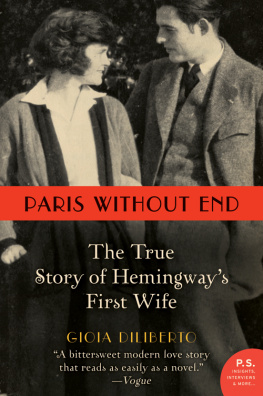
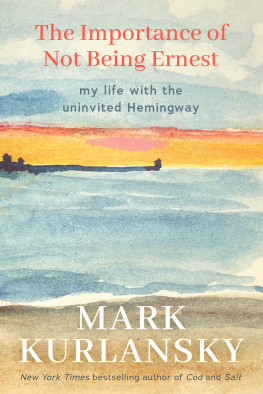
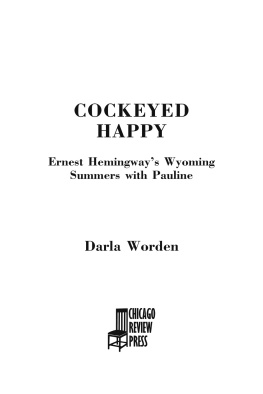
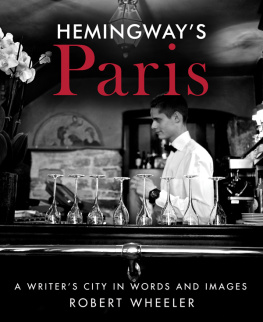
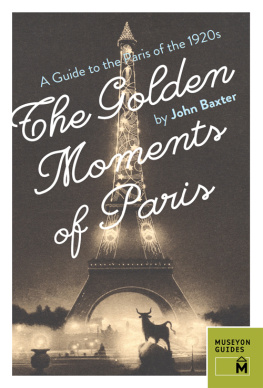
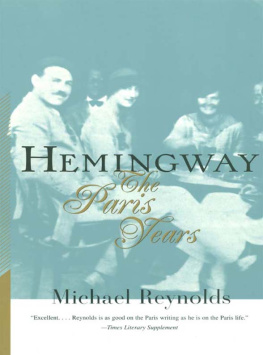
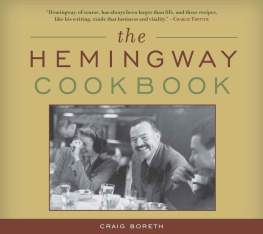
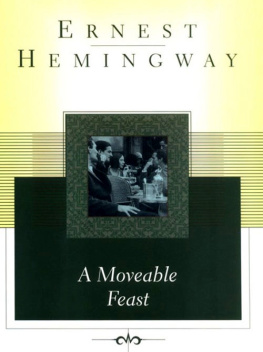
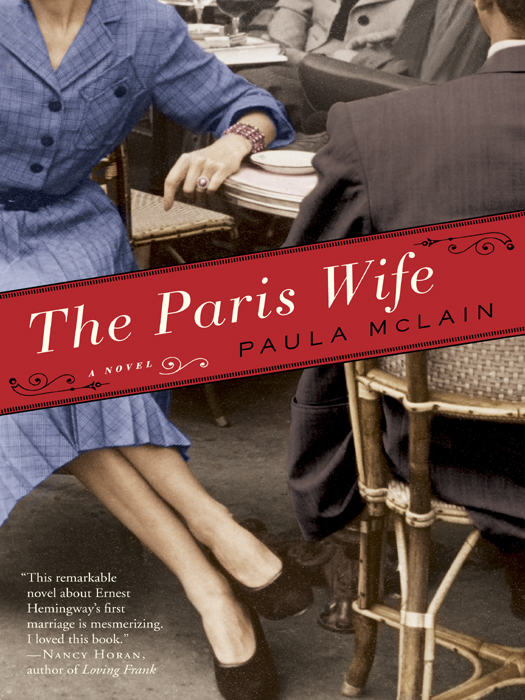
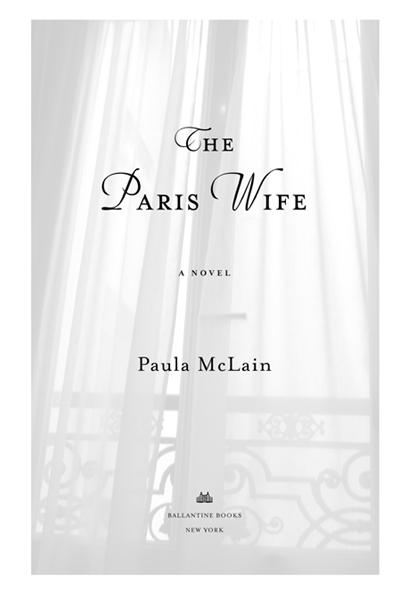
 hough I often looked for one, I finally had to admit that there could be no cure for Paris. Part of it was the war. The world had ended once already and could again at any moment. The war had come and changed us by happening when everyone said it couldnt. No one knew how many had died, but when you heard the numbersnine million or fourteen millionyou thought, Impossible. Paris was full of ghosts and the walking wounded. Many came back to Rouen or Oak Park, Illinois, shot through and carrying little pieces of what theyd seen behind their kneecaps, full of an emptiness they could never dislodge. Theyd carried bodies on stretchers, stepping over other bodies to do it; theyd been on stretchers themselves, on slow-moving trains full of flies and the floating voice of someone saying he wanted to be remembered to his girl back home.
hough I often looked for one, I finally had to admit that there could be no cure for Paris. Part of it was the war. The world had ended once already and could again at any moment. The war had come and changed us by happening when everyone said it couldnt. No one knew how many had died, but when you heard the numbersnine million or fourteen millionyou thought, Impossible. Paris was full of ghosts and the walking wounded. Many came back to Rouen or Oak Park, Illinois, shot through and carrying little pieces of what theyd seen behind their kneecaps, full of an emptiness they could never dislodge. Theyd carried bodies on stretchers, stepping over other bodies to do it; theyd been on stretchers themselves, on slow-moving trains full of flies and the floating voice of someone saying he wanted to be remembered to his girl back home.